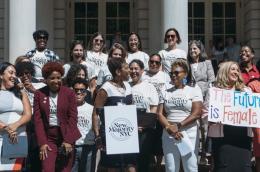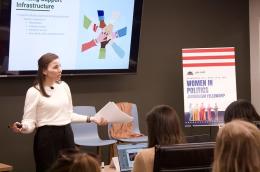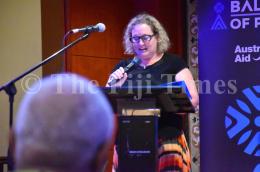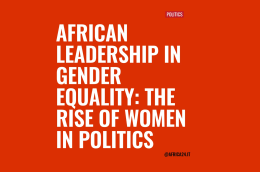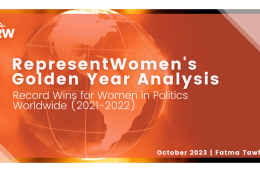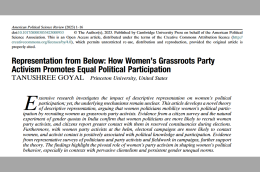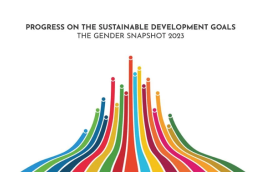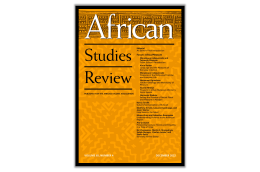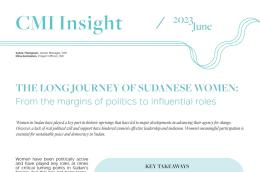Women's Leadership
Main navigation
Despite their increasing visibility, women in government must still contend with gendered biases about the ways in which they choose to present themselves.
New York City Council Member Shahana Hanif represents many firsts for the New York City Council. Not only is she the first woman to represent her district, but she is also the first-ever Muslim woman on the Council and one of two members of South Asian descent.
She was one of the first of her colleagues to openly support a ceasefire in Israel’s war against Gaza, and she has also helped propel the city’s immigrant workers’ bill of rights and universal composting program forward.
She is unique in her accomplishments and aspirations as a politician, yet she told City & State in an interview that she was once taken aback by a complaint – not about her work – but about her hair not looking like “some of these other council members who do their hair and appear presentable,” she said.
Read here the full article published by the City and State of New York on 25 April 2024.
Image by City and State of New York
Tracking the number of women in elective office represents only one measure of political power, two Rutgers University researchers told the 2024 National Press Foundation Women in Politics Fellowship.
They say entrenched inequities persist in legislative leadership, fundraising, and the outsized influence of unelected gatekeepers.
“We know that keeping track of women’s political representation, specifically the numbers of women in elective office, is just one piece of a larger puzzle to understanding and addressing disparities in women’s political power,” said Kelly Dittmar, associate professor of political science and director of research Center for American Women and Politics at Rutgers University.
Read here the full article published by National Press Foundation on 25 April 2024.
Image by National Press Foundation
Last year, we have worked with students of journalism and their assistant professor Jovana Davidović on combating sexist hate speech, sexism and misogyny. Our spectacular #NextGen gender equality advocates and young journalists Jovana Damjanović, Marija Pešić and Željka Zvicer, with support of Marija Blagojević from UNDP, held workshop on sexism and gender equality to the journalism students at Faculty of Political Sciences. As a follow up, students have further researched the topics and have written blog posts on various related aspects. We are proud to feature young voices promoting gender equality!
“It is interesting that Montenegro is known for a large number of women who left historical traces in the development of our country. I am proud that the women who grew up 'on the Montenegrin karst and land' are fearless, both in the past and today.”
This is how Marko Vulević, who was declared the best student of the Faculty of Political Sciences by the University of Montenegro, started the conversation on the topic of gender equality.
Men are still dominant in Montenegrin politics
The turning point for the participation of Montenegrin women in public life, i.e. politics, was recorded in 1946 – when they got the right to vote. Although progress has been made since then, there is still a large imbalance in representation and power between men and women in the political sphere.
Out of 81 seats in the highest legislative body, we currently have as few as 22 female MPs, which represents slightly more than 27 percent. The majority of the population is aware of this very devastating fact. Still, it seems that, unfortunately, they run away from it, "tucked away" in their patriarchal beliefs, which are based on underestimating the personal, as well as the professional capacities of girls, women, and later women. Why? Because they were taught from an early age that the man is the “head of the household”, that he makes all the important decisions for the family independently, and that the woman is the foundation of the home, that her role is to take care of the children and their upbringing, and that female children have minimal rights.
Read here the full article published by UNDP on 22 April 2024.
Less than 7 per cent of Pacific politicians are women, compared with 27 per cent globally.
This means the Pacific’s representation of women in politics is among the worst in any region in the world, says an Op-Ed penned last month by former New Zealand Prime Minister, Helen Clark, and United Nations Development Program (UNDP) Pacific Office resident representative Munkhtuya Altangerel.
The writers further stated that while a semblance of progress is being made, this is being done at a snail’s pace compared with the accelerated need for change required by the region.
And in Fiji’s context, only five of the 55 Parliamentarians, elected in the 2022 General Election, are women. These numbers have dropped consistently since the 2014 election.
So why the disparity?
Historically, leaders like Taufa Vakatale, Fiji’s first woman deputy prime minister or former Lautoka mayor Maureen Wright, the first woman to be elected to local government in 1967, have been trailblazers on the political scene.
Now, with the impending municipal council elections, the topic of whether women’s participation in these spaces will be up for discussion.
And to further empower women in leadership roles, the Balance of Power project was born. The program, funded by the Australian Government, maintains a presence in Fiji, Tonga, and Vanuatu.
Its primary role is to support Pacific Island countries achieve their objectives of inclusive and effective leadership in line with their national policy frameworks.
The interesting aspect is its local-led approach, which has also culminated in partnerships with several NGOs and partners on the ground.
Last week, the project was formally launched in Suva, and partners are hopeful this initiative will bring a change in women’s participation in the upcoming elections.
Read here the full article published by The Fiji Times on 15 April 2024.
Image source: Fiji Times
Breaking the Glass Ceiling: Africa’s Stride Towards Gender Equality in Governance
As nations grapple with gender disparities, it’s clear that the struggle for equality penetrates deeply into various facets of life—social, economic, and political realms have all historically been skewed against women. Nevertheless, a transformative wave has been sweeping across the globe, altering perceptions and ushering in an era where women are increasingly recognized for their substantial contributions to society. This shift is particularly evident in the realm of politics, where the presence of women is not just a token gesture but a critical factor in shaping inclusive and equitable policies.
Three things to know:
1.The Changing Face of Political Participation
2.The African Vanguard in Gender Diversity
3.The Parliamentary Gender Diversity Milestone
Read here the full article published by Africa 24 on 7 April 2024.
Image source: Africa 24
Weekend Reading on Women’s Representation is a compilation of stories about women’s representation in politics, on boards, in sports and entertainment, in judicial offices and in the private sector in the U.S. and around the world—with a little gardening and goodwill mixed in for refreshment!
We here at RepresentWomen honor Cynthia Richie Terrell—the founder and executive director of RepresentWomen—for her 60th birthday and the fantastic work she does to achieve parity in this political space. The regular contributor behind this weekly column, Terrell is an outspoken advocate for innovative rules and systems reforms to advance women’s representation and leadership in the United States.
Support her through supporting our organization as we continue our fundraising initiative. Your generosity will aid us in continuing our mission of dismantling barriers that impede women’s ability to run for office and win.
Melinda French Gates once said, “A woman with a voice is, by definition, a strong woman.” By this definition, Cynthia Richie Terrell is a woman who uses her voice to amplify the strength of many women and their belief that we deserve equitable representation.
Read here the full article published by Ms. Magazine on 5 April 2024.
Image source: Ms. Magazine
